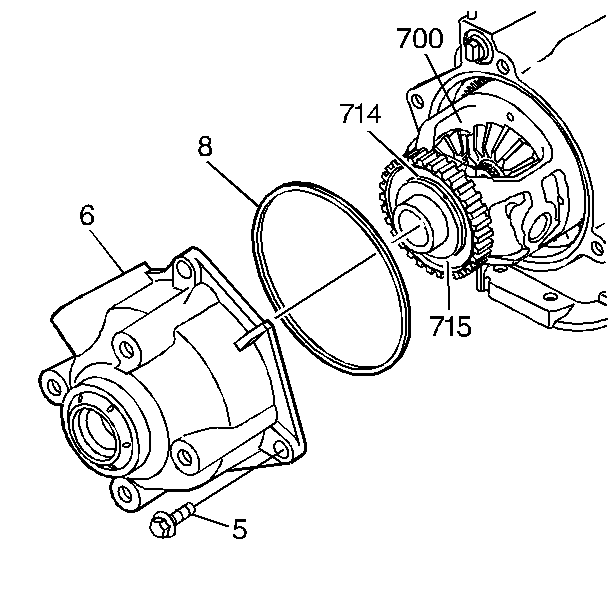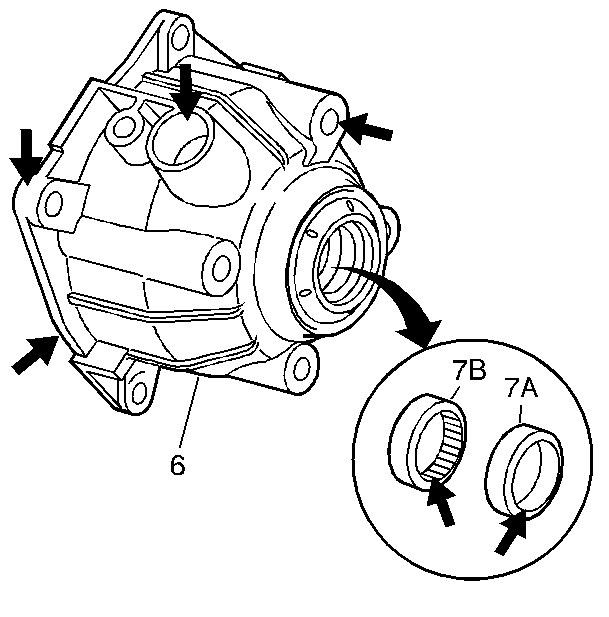Removal Procedure
Caution: Before servicing any electrical component, the ignition and start switch must be in the OFF or LOCK position and all electrical loads
must be OFF, unless instructed otherwise in these procedures. If a tool or equipment could easily come in contact with a live exposed electrical terminal, also disconnect the negative battery cable. Failure to follow these precautions may cause personal injury
and/or damage to the vehicle or its components.
- Disconnect the battery ground (negative) cable. Refer to
Battery Negative Cable Disconnection and Connection
in Engine Electrical.
- Raise and support the vehicle. Refer to
Lifting and Jacking the Vehicle
in General Information.
- Disconnect the right drive axle from the transaxle. Refer to
Wheel Drive Shaft Replacement
in Wheel Drive Shafts.
- Remove the right (rear) engine mount. Refer to
Engine Front Mount Replacement
in Engine Mechanical.
- Remove the right (rear) engine mount. bracket. Refer to
Engine Mount Bracket Replacement - Right Side
in Engine
Mechanical.
- Remove the transaxle brace. Refer to
Transmission Brace Replacement
.
- Remove the vehicle speed sensor. Refer to
Vehicle Speed Sensor Replacement
.

- Remove the case extension housing bolts (5).
- Remove the case extension housing (6) with the axle seal and the
O-ring (8).

- Inspect the case extension
housing (6) for the following conditions:
| • | A damaged or porous sealing surface for the case extension seal |
| • | A damaged or porous sealing surface for the vehicle speed sensor |
| • | A damaged or porous sealing surface for the right drive axle oil
seal |
| • | A damaged or porous sealing surface for the case extension housing |
| • | A damaged or worn differential carrier bushing or output shaft
bearing |
| • | Inspect the drive axle seal and replace if necessary |
Installation Procedure
- If removed, install the drive axle seal. Refer to
Front Wheel Drive Shaft Oil Seal Replacement - Right Side
.

- Install the case extension housing (6) with the axle seal and with the
O-ring (8).
Notice: Use the correct fastener in the correct location. Replacement fasteners
must be the correct part number for that application. Fasteners requiring
replacement or fasteners requiring the use of thread locking compound or sealant
are identified in the service procedure. Do not use paints, lubricants, or
corrosion inhibitors on fasteners or fastener joint surfaces unless specified.
These coatings affect fastener torque and joint clamping force and may damage
the fastener. Use the correct tightening sequence and specifications when
installing fasteners in order to avoid damage to parts and systems.
- Install the case
extension housing bolts (5).
Tighten
Tighten the bolts (5) to 36 N·m (27 lb ft).
- Install the vehicle speed sensor. Refer to
Vehicle Speed Sensor Replacement
.
- Install the transaxle brace. Refer to
Transmission Brace Replacement
.
- Remove the right (rear) engine mount. bracket. Refer to
Engine Mount Bracket Replacement - Right Side
in Engine
Mechanical.
- Remove the right (rear) engine mount. Refer to
Engine Front Mount Replacement
in Engine Mechanical - 3.5L.
- Connect the right drive axle to the transaxle. Refer to
Wheel Drive Shaft Replacement
in Wheel Drive Shafts.
- Lower the vehicle.
- Connect the battery ground (negative) cable. Refer to
Battery Negative Cable Disconnection and Connection
in Engine Electrical.
Notice: Do NOT overfill the transaxle. The overfilling of the transaxle
causes foaming, loss of fluid, shift complaints, and possible damage to the
transaxle.
- Adjust the fluid level. Refer to
Approximate Fluid Capacities
,
Fluid and Lubricant Recommendations
in Maintenance and Lubrication.
- Inspect for fluid leaks.



